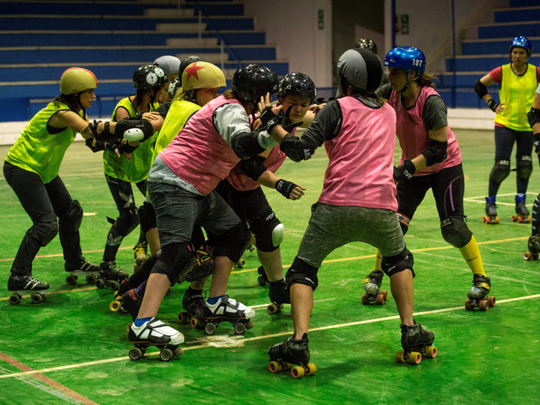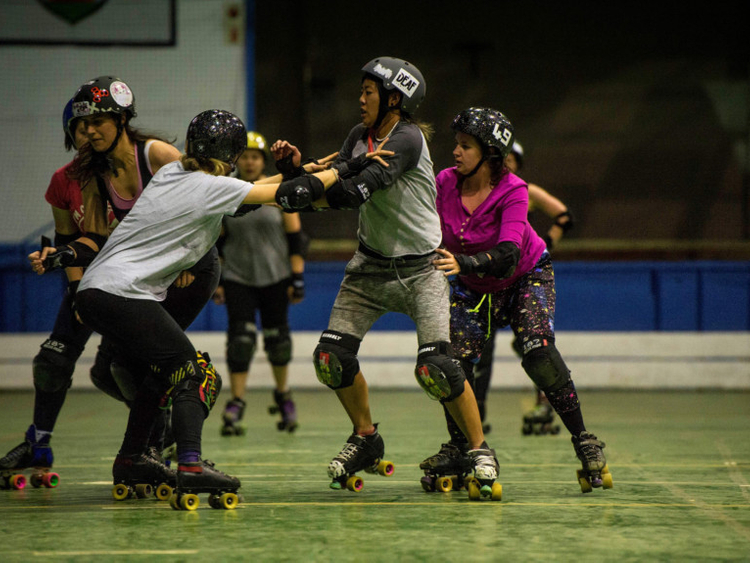
JOHANNESBURG
Aimee Olsen has been injured many times, but the thrill is irresistible “because it’s a high adrenalin sport,” says one of the South African women who have become hooked on roller derby.
Fast-paced and aggressive, the contact sport provides a welcome bout of stress release for women players who say it’s an addictive exercise far better than any gym.
“Link up a little tighter!” coach Nic Chalmers yells out during a twice-weekly practice session as players on roller skates speed around a concrete floor barging into each other.
Sporting brightly-coloured crash helmets and protective elbow, knee and mouth guards, two teams of five skaters compete in a sports hall in Johannesburg’s southern suburb of Turffontein.
They are all skating in the same direction, but one player — the “jammer” — scores points by careening through four blockers from the rival team in hectic, two-minute bouts.
Flat-track roller derby is well-established in the United States. but in Africa is only played in Egypt and South Africa, where it was introduced in 2011 by two South African women after watching the film Whip-It, about a Texas teen who shakes off her small-town misery by trying the sport.
“One of the most attractive, most liberating things about roller derby is that it doesn’t matter how big, how small, how unfit, how old, how young you are — this is for you,” said Dianne Silva, 30, a medic and keen roller derby fan.
Players include lawyers, film-makers, full-time mothers and shop assistants — many of whom never played sport before joining up.
For the women, aged from 19 to mid-40s, it is more than a sport. It’s a passion that empowers players, encouraging them to be physically and mentally challenged to the limit.
“Roller derby is not for dumb people,” said Silva, who is the chairwoman of South Africa’s C-Max Roller Derby league, in which four teams compete.
“We are constantly using our brains on track, and it’s fast and we play offence and defence at the same time.”
“It’s a thinking game,” she adds of a sport sometimes described as “rugby without a ball and on skates”, or even “playing chess while bricks are being thrown at you.”
Players say it soon generates a strong sense of camaraderie.
“It doesn’t matter what your background is, it doesn’t matter if you have a sporting background or not, it’s a community,” said national coach Chalmers.
Being thrown down on their knees or chests, or pitched onto their backs or backsides is part of the experience during the 30-minute matches. But players quickly pull themselves up and charge back into action.
“It encourages me to be powerful. I’m not the smallest person, with this I can be fast,” said Aimee Plank, 23.
“It celebrates my size, and that makes me powerful ... It makes me feel I can do anything on skates.”
Off the track “immediately you come here, you have this kind of ready-made family. It becomes part of your everyday life,” said Olsen during a rest in the hall which is normally used for martial arts and hockey.
Edgy nicknames are something of a rite of passage in the sport. The league itself is named after one of South Africa’s maximum security jails, C-Max in Kokstad.
Teams have punning names such as Thundering Hellcats or Raging Warmones while players go by such monikers as Faye Tality, Betty Bone Crusher and Clap Cake.
“It’s like an alter ego that I can go on skates and be the person I want to be,” said Plank, whose derby name is Iron Tyrant.
For its South African enthusiasts, the next challenge is to attract more black players.
“Roller derby is a community, [and] we pride ourselves as being diverse,” said Olsen.
— AFP













